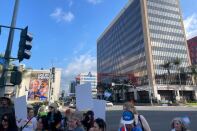Tens of thousands of University of California employees walked off the job Wednesday as contract negotiations hit a wall.
The strike threatens to disrupt patient care, research and other campus functions statewide.
Picket lines began early in the morning, with rallies on campuses midday.
Two unions are on strike:
- AFSCME Local 3299, which includes 37,000 service workers, patient care technical workers and other skilled craft workers.
- University Professional and Technical Employees (UPTE) Local 9119, which includes 20,000 clinical researchers, IT analysts, mental health counselors and nurse case managers.
Both are currently in the middle of strained contract negotiations with the university system.
The unions and UC have accused each other of bargaining in bad faith, and the unions have also accused the university system of unfair labor practices, a tipping point that led to this week's strikes.
What do the UC workers want?
The demands from each union share a lot of overlap, including wage increases of 8% or more each of the next three years, a $25 minimum wage retroactive to 2023 and better benefits.
UPTE also highlighted its demands for clearer career growth pathways. Its leadership says the goal is to fix a staffing and retention crisis that harms research and patients.

Maryam Azizadah is a research coordinator at UCLA. She said better pay and benefits would help recruit and keep colleagues.
“It's really hard to not make mistakes when you have so many patients and so many of these really detailed protocols for these cancer research trials,” she said. “If we don't have enough time to be meticulous it ends up affecting the research.”
Julia Mangione, a research coordinator at UC Irvine, said people are constantly leaving for better paying jobs.
"We hear that people work two or three research jobs just to make ends meet, or they have to work outside of their field to pay the bills," she said. "But they stay in research because they care about their patients, they care about their participants, and they're deeply passionate about the work."
The university maintains there is no staffing crisis. In a statement, UC spokesperson Heather Hansen said the system has been hiring more staff and that turnover is improving among UPTE-represented employees.
But others LAist talked to said they're not feeling supported.
Max Belasco, a UCLA graduate, is now an IT worker at his alma mater’s law school. On top of his work on campus, he provides technical support for the Immigrant Family Legal Clinic at several community schools in the Koreatown and Pico Union area.
Belasco told LAist that colleagues often feel the need to apply for external positions to gain leverage when attempting to advance in their UC careers.
“That opens us up to [potentially] losing a lot of institutional knowledge, which is very specialized inside of IT,” he said.
Anushree Belur, a psychologist at the UC Irvine student counseling center, said she’s had to call out sick twice this month.
“What we are noticing is when we get burnt out, that leads to greater absences,” she said. “We’re not able to take care of ourselves, and we feel it ... There are times when your body feels the stress.”
She said those absences translate into more disruption for students.
How might the strikes affect patient care?
UPTE executive vice president Matias Campos, a staff pharmacist at UC San Francisco, said core emergency services will remain available at university hospitals.
“We ask that patients contact their provider to suss out what will be impact[ed],” he added. “We anticipate that procedures will need to be rescheduled,” along with “non-urgent clinic patient visits, to accommodate the large number of workers that will be striking.”
On Wednesday afternoon, UC Irvine spokesperson John Murray said via email that the university's inpatient and outpatient locations remain open for patient care, and that about 850 healthcare professionals were brought in to temporarily backfill positions.
“This has been a hard choice,” said Michael McGlenn, a clinical psychologist at UC San Diego.

He and his colleagues support the mental health of over 45,000 students.
“We care very much about our patients,” he added. “I will be honest: [I] don't love the idea of leaving them with delayed care.”
But according to McGlenn, students already “have to wait weeks, if not longer, to see a provider for their first appointment.” Then they have to wait “more weeks” for follow-up appointments. In his view, students are already being harmed by the status quo.
“The only way we can make sure that our clinics are appropriately staffed and that they have the resources we need is if we do go on strike,” he said.
Education editor Ross Brenneman contributed to this story.















